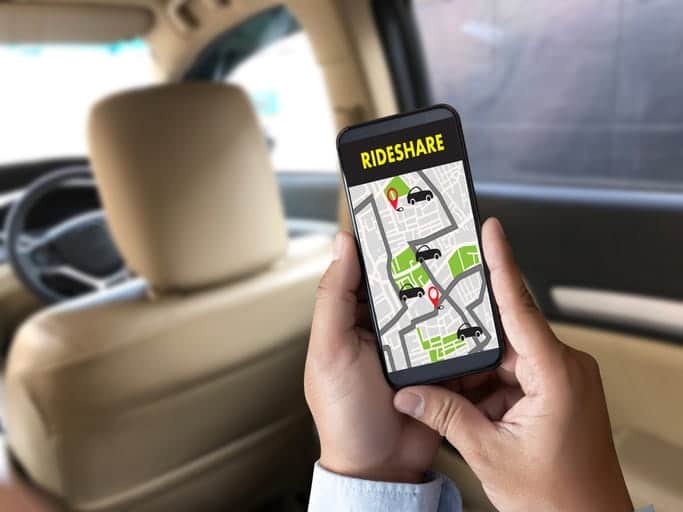Experienced Miami Lyft Accident Lawyer
HAVE YOU BEEN INVOLVED IN A CAR ACCIDENT WITH A rIDESHARE VEHICLE?
Like regular accidents, rideshare accidents can be stressful and difficult for the victims involved. Having an experienced Miami Lyft accident attorney can be crucial in receiving compensation.
Results You Can Trust
With proven results, extensive experience, and a passion for justice, the attorneys at Bernstein & Maryanoff are committed to protecting your rights.
Do I have a Lyft accident claim?

Although it’s easy to believe that rideshare accidents and regular car accidents are essentially the same, there are significant differences between these types of vehicle accident claims. The main differences are the parties that can be held accountable for the accident and how insurance coverage plays a role in paying out these claims.
One of the key elements behind a rideshare accident claim is the sequence in which the events took place. This includes the stage the rideshare driver is in at the time the passenger asserts their claim:
- Stage 1 – available: The rideshare driver’s app is on, and they are available to pick up passengers
- Stage 2 – en route: A driver has accepted a passenger’s ride request and is going to pick them up
- Stage 3 – on the trip: A driver has a passenger in the car heading to their destination
If you believe your specific incident shares any of these required elements, then you may have a legitimate Lyft accident claim. The personal injury attorneys at Bernstein & Maryanoff can help assess your incident to determine whether your Lyft claim can be pursued.
NO FEES UNLESS WE WIN
Protecting Your Rights Since 1983
If you or a loved one has been injured in a rideshare accident, schedule a free consultation with the personal injury attorneys at Bernstein & Maryanoff today.
Hablamos Español
What laws apply to a Lyft accident claim?
Florida’s rideshare laws
Transportation network companies, also referred to as TNCs, include rideshare services such as Uber and Lyft. Under the TNC, Uber and Lyft, as well as other ridesharing companies, are required to follow the rules and regulations of TNC operations in the state of Florida:
- Adopt a zero-tolerance policy for drug and alcohol use while driving
- Review the driving history of all perspective drivers
- Prohibit drivers who are on the national sex offender registry
- Carry appropriate insurance minimums that satisfy TNC requirements
- Conduct criminal background checks for prospective drivers
- Subject potential drivers to thorough background screenings
Lyft vehicle and driver requirements
In addition to the rideshare companies adhering to the TNC rules and regulations, rideshare drivers must abide by the TNC insurance required to operate their rideshare vehicles in the state. In Florida specifically, drivers for services such as Uber and Lyft must have an auto liability insurance policy that covers the following:
- Primary auto liability coverage of at least $50,000 for death and bodily injury per person
- Primary auto liability coverage of at least $100,000 for death and bodily injury per incident
- PDL coverage of at least $25,000 per incident
- PIP and uninsured/underinsured motorist (UIM) coverage as required by existing Florida state law
Lyft insurance coverage
Lyft, as well as Uber, provides their own $1.5 million on coverage limits. This insurance ensures that passengers are covered in the event of an accident taking place. Understanding the stages within the rideshare driver’s sequence of events is imperative when determining coverage.
Are passengers covered by Lyft insurance coverage?
Each stage within the driver’s timeframe can impact how the rideshare’s insurance coverage operates and determine whether the passenger may be covered by the insurance:
- Stage 1 – available: If a rideshare driver is using their vehicle for personal use and the rideshare app is off, the driver’s PIP insurance will kick in in the event of an accident. However, if the app is on and they are available to pick up passengers, their rideshare company’s coverage may kick in if an accident occurs.
- Stage 2 – en-route: The rideshare company’s insurance policy is in force after a driver is paired with a passenger. Depending on the circumstances, a driver’s rideshare insurance policy may extend coverage as well.
- Stage 3 – passenger picked up: If a rideshare driver is on the way to pick up a passenger or has already picked up the passenger, Florida law entails that the rideshare company’s insurance policy kicks in to provide primary liability
Does the Lyft driver have to provide their insurance information?
Florida statutes § 627.748 require each Lyft driver to carry proof of their insurance coverage and present it to anyone involved in an accident.
Proving negligence in a Lyft accident
Proving negligence in a Lyft accident is similar to proving negligence in any other personal injury case. The plaintiff must be able to establish the four elements of negligence:
- Duty: This first element requires the plaintiff to prove that there was a duty owed to them by the defendant. In a rideshare case, the driver has a duty to escort the passenger safely to their destination.
- Breach of duty: This next element requires the plaintiff to demonstrate that the driver breached their duty in some way
- Cause of injury: For the third element of negligence, the plaintiff must be able to show that the defendant’s breach of duty was the cause of the plaintiff’s injuries. Had the defendant not acted negligently, the plaintiff would not have suffered any injuries.
- Damages: This final element of negligence requires the plaintiff to show that, as a result of the defendant’s breach of duty and the subsequent injuries, the plaintiff has endured damages that can be compensated for
What can I win in a Lyft accident lawsuit?
Plaintiffs in a Lyft accident lawsuit may be entitled to a variety of damages, with the two main categories of damages consisting of economic and non-economic damages. Each of these categories of damages ensures you are compensated for any financial losses you may have suffered as a result of the incident.
Punitive damages, though rare, can also be an option for victims of a rideshare accident. These damages arise when there are criminal elements that the negligent party must be held accountable for.
Monetary damages
Economic damages, also referred to as monetary damages, are financial losses that are typically quite simple to calculate. Some of the most common economic damages include:
- Medical treatment
- Hospital bills
- Surgeries
- The costs of prescription medications and rehabilitation
- Lost income due to taking time off work because of your injuries and the income you would have earned during that time
- Property damage
Non-monetary damages
Non-economic damages, also referred to as non-monetary damages, compensate the victim for losses that are not easily calculated by a monetary value. Non-economic damages are implemented to ensure that the victim is compensated for any pain and suffering they may have endured as a result of the opposing party’s negligence. Some of the most commonly sought-after non-economic damages in rides lawsuits include:
- Pain and suffering
- Emotional distress
- Loss of enjoyment of life
- Disfigurement and scarring
What sets our Miami Lyft accident attorneys apart?
Like regular car accidents, rideshare car accidents are all unique to one another. This means that rideshare claims can reach significantly different holdings based on the specifics of the issue and which parties are liable.
Given the uniqueness of rideshare accident claims, it’s essential to have an experienced and well-equipped rideshare accident attorney at your assistance. A good rideshare attorney will ensure that you can focus on your recovery while fighting for your rights and compensation.
Here at Bernstein & Maryanoff, we are proud to have experienced rideshare accident attorneys who work toward:
- Proving your case
- Determining which insurance entity to file claims with
- Fighting denied claims
- Avoiding low settlement offers
How can our Lyft accident attorneys help?
Like regular car accidents, rideshare accidents can be stressful and confusing. Our car accident attorneys can help you in the following ways:
- Identify who is responsible for paying damages based on no-fault and third-party car accident laws in Florida, including in the case of a Lyft driver hit-and-run
- Report the accident to Lyft and the insurance companies, and provide them with the correct information while preserving your rights
- Help you identify damages and document them as part of your claim
- Understand Florida law for transportation networking companies, including Lyft
- Determine what level of insurance coverage applies based on whether the app is active or a ride is in motion
- Make various claims to the insurance companies on your behalf while understanding how to pursue compensation when multiple claims are involved
- Evaluate settlement offers to determine how to proceed with the claim
- Negotiate your case
- If necessary, file formal legal actions, including appearances in court and use of the legal process
Miami Lyft accident attorneys

If you or a loved one has been injured in a rideshare accident, it’s important to understand that you have legal rights and plenty of options to pursue claims. Our experienced Miami Lyft accident attorneys at Bernstein & Maryanoff are here to help ensure you recover and receive proper compensation for your damages.
NO FEES UNLESS WE WIN
Protecting Your Rights Since 1983
Contact the personal injury attorneys at Bernstein & Maryanoff to discuss your rideshare claims during a free consultation.
Hablamos Español
Sources:
Barrett, S. (2023). Types of Personal Injury Damages and Compensation.
Goguen, D. (2023). Negligence, The “Duty of Care,” and Fault for an Accident.
Punitive Damages Definition. (2023).
Special Damages Definition. (2023).
